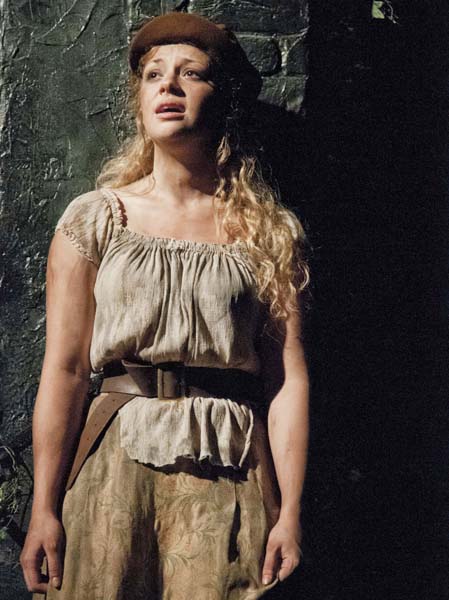
Hats Off
For the performers, foldback is non-existent. They rely on the sound of the mic, and the mix out front; and from my seat, bang in the center of the stalls, it sounded incredible.
“We’ve got all 40 cast members on DPA mics, too; they’re so discreet, and the capsules are tiny. We close-mic everyone with a 4061, and the principles each have a pair, one is a backup,” Cobey says. “It’s a tricky balance, really, as in the ideal world, you want a mic here [mimics singing into a handheld], but that’s just not possible in theatre, as all theatre producers want them hidden. Thankfully, the DPAs are not only durable, but they really do deliver; the quality of audio is fantastic, and in this environment, you’re as strong as your weakest link, so that’s crucial.
“There are also an extraordinary amount of hats being used on this show, and we put a 4061 on each of them, too. It might sound strange, but often, as soon as a cast member puts on a hat, the mic on their forehead becomes covered, so that’s the end of that! So we just add them to the hats, and then we paint up the 4061 capsules to suit the respective performers’ hairlines, so we have every base covered.”
He adds that the crew is also phenomenal – and it sounds like they have to be. “Les Mis is an oiled ship; there are lots of contingencies, but it’s a strict plot, and the whole team know the show so well. We always keep a dialogue open with the cast and the musical director, and although with musical theatre, there is always a compromise, there are no standoffs or Chinese whispers here; it’s a great team, and it’s very transparent,” he insists, very matter of fact.
“And having been a musician and performer here and there myself, if there ever is a problem, I can usually see it before it becomes apparent; working in confined spaces with orchestras, I can always tell before the musicians arrive that there won’t be enough room, for example, so I can be ahead of the game for sound checks, which is very useful.”
It’s a tough job, mixing for theatre – no doubt about it. So what advice can Cobey offer to any wannabe theatre engineers?
“[smiles] Don’t dive into Les Mis as your first job in theatre, as it’s a big ask! I’d say get involved in amateur theatre, and bug people; keep on their case, and watch what they do. As a friend of mine says, be a sponge – but without making a nuisance of yourself. Ask to dep on shows, certainly. Being at the desk comes a bit later, but being involved in musical theatre is about learning the radio side of it, and then being involved in the cast; and there are a lot of departments you have to liaise with. Mics travel through wigs and wardrobes, so being a people person is a big part of it.
“You also have to love it to do it, as it’s different every night. People are always on holiday, and the nature of how the Musicians’ Union works means we never have the same set of musicians in; we can have up to eight deps per performance, and that can really affect the show. Not in a bad way, but you end up building up a database of things in your head, really; that’s how I treat it as I come in the building when I see who is on, who is off, and who is covering what, and so on. It’s your job to have that snapshot in your head out there, and do your best to recreate what the designer wants on that day.”
Showtime
I was genuinely gobsmacked throughout this Les Mis performance. It’s powerful, and it’s moving; it’s hilarious, and it’s heartbreaking. In short, it’s a bloody masterpiece. What was also evident was the work of the crew, as Cobey had told me about earlier. The scene changes were entirely seamless, and to me, it looked like the whole production went without a hitch.
Audio-wise, it was just magical, and although it wasn’t loud, it somehow filled the auditorium; when the chorus sang, they were bang on the money, and some of the solos were mesmerising. A shout-out must go to the brilliant Tom Edden for his portrayal of The·nardier, and to the awesome vocal talents of Carrie Hope-Fletcher, who has clearly made Eponine her own. To the whole cast and crew, a big thumbs up. The only question left is: When can I come again?
Headliner editor Paul Watson has 10 years live touring experience with bands in the UK and the US, and ran an independent recording studio for five years close to London. He also serves as the editor for Europe for Live Sound International and ProSoundWeb.
Headliner is a UK-based publication that supports the creative community, focusing on live performances, recording sessions, theatre productions, and major broadcast events. The spotlight is on the technology, but with a lifestyle approach. Find out more here, and subscribe here.

